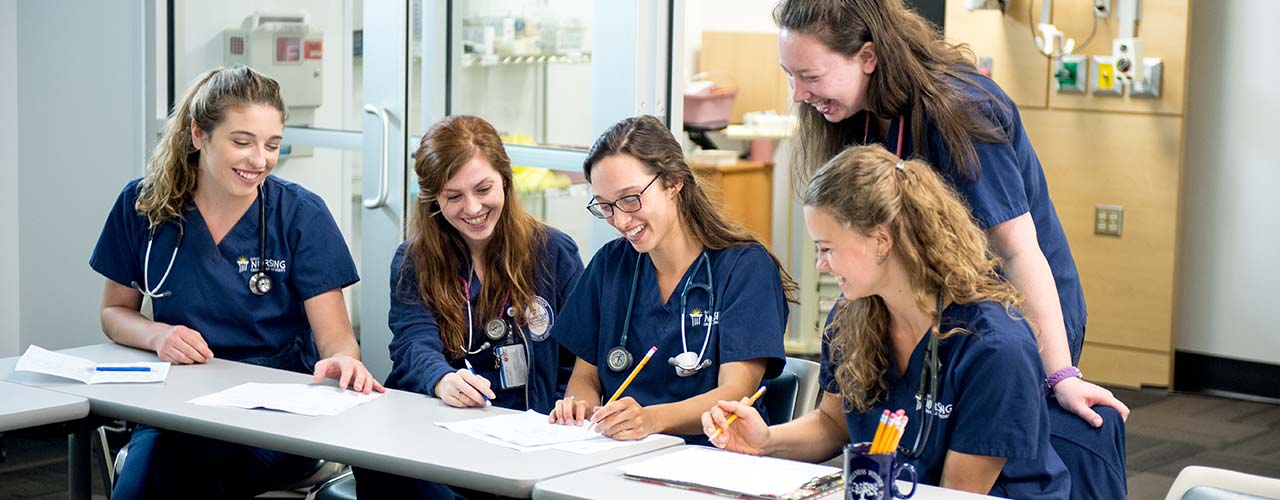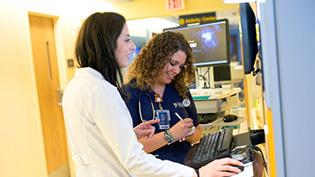
Nursing Student Experiences

Simulations
Realistic, life-sized simulators are used to provide students opportunities to develop their clinical judgment and decision-making in a safe, true-to-life clinical setting. During simulation, nursing students have an opportunity to integrate classroom knowledge and physical assessment skills as well as practice professional collaboration. After each simulation, students reflect on the recent experience under the guidance of a trained faculty member. Students also have access to an electronic medical record (EMR), which assists them in documenting their clinical findings.
Our state-of-the-art simulation and clinical lab facilities are located in the Health Sciences Center, which opened in 2012. Simulation Center faculty members have received national recognition by the National League for Nursing, presented in regional, national, and international venues, and have been certified by the Society for Simulation in Healthcare (Certified Healthcare Simulation Educator).
The variety of simulated activities has been designed to help our students fulfill Cedarville University’s mission to be a Christian learning community that exhibits the spirit of Jesus Christ and recognizes the values of God's Kingdom. Simulation is used to help equip nursing students to grow academically, and to address spiritual, physical, and emotional needs from a biblical perspective. Simulation is one more way that students learn to apply the concepts of relational accountability, personal integrity, and to use nursing as ministry for Christ.
As the complexity of health care increases, simulation is an excellent means to prepare students for the challenges in healthcare today.

Clinical Experiences
Cedarville University School of Nursing has developed excellent relationships with the highly recognized health care facilities in the surrounding area, allowing nursing students the opportunity to care for a variety of patients in diverse settings. Highly qualified faculty members provide expertise and experience in both the classroom and clinical settings. The School of Nursing is committed to maintaining the reputation our students and new graduates have gained within the health care community.
Clinical experiences begin for the students at the completion of their sophomore year. The clinical immersion course allows students to gain confidence as they transition into the junior year clinical nursing core. The junior year clinical nursing core includes care of women and babies, children, ill adults, and behavioral and mental health nursing. Students entering the senior year are prepared to provide complex care management in both acute care and public health setting. The public health clinical includes a variety of agencies offering experiences in school nursing, public health nursing, primary care clinics, faith-based ministries, homeless shelters, and occupational health nursing. The students complete a community assessment and provide a health education session specific for the population, such as healthy nutrition for elementary school children or oral hygiene and oral cancer risks for people living in poverty. The clinical experiences culminate in a transition to practice “preceptorship.” Each student is given the opportunity to select an area of interest, depending on availability. Under the supervision of a faculty member, students are paired with a practicing RN and work full time during this five-week experience.
Each clinical experience allows nursing students to function as part of the health care team in leading and directing patient care. These experiences also allow for opportunities to provide compassionate care to those at a time of greatest need, demonstrating nursing as ministry.

Mission Experiences
Junior nursing students have the opportunity to participate in teams with a faculty member or RN in a variety of locations including Togo (West Africa), Philippines, Dominican Republic, and Alaska. These trips range from one to five weeks and include opportunities to minister in hospital settings with experiences in the operating room, labor and delivery, pediatrics, and adult medical care. Other ministries occur in the community including working in clinics, schools, homes, and churches. Students raise their own support to fund this opportunity and gain a valuable cross-cultural experience in sharing Christ with others through nursing.

















